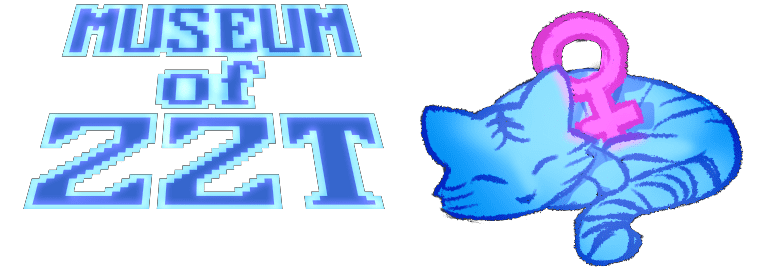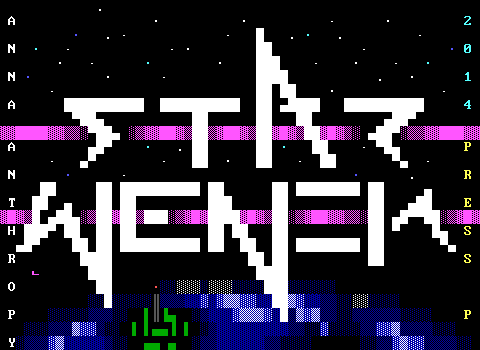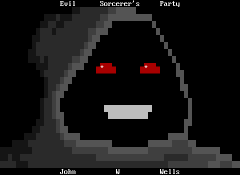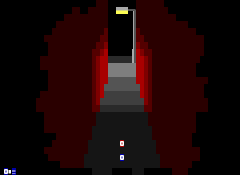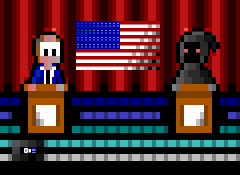Background and Story:
When ESP Demo was released back in the day, it was with little fanfare. Nobody really took any notice of it. It was a demo amongst hundereds of demos, and nobody really knew much about its author, Mr. J.W. Wells, other than that he liked to frequent the forums with random stuff about operas and sorcery that seemed more out of place to your average preteen ZZTer than craNKGod in a sperm bank. I did manage to find the time to play it though, and I'm glad I did. It didn't look all that special, but the gameplay and writing was far above my personal expectations of a modern ZZT game - which are already quite high - and two thoughts entered my head. The first was that the game had the potential to be brilliant, and the second that the game would never ever be finished.
When news came that Funk ["Indiana Jones and the Lost Crusaders"] was going to be doing the art for ESP, it only added to my pessimism. Not because Funk wasn't very good at art - far from it - but because the game now had a label that had doomed all previous games under it to failure. A genre that even IF couldn't pull off to any great effect back when it had some of the best ZZTers in the world in its name. It was now a 'joint' project.
When news came that the second disc had corrupted and that Funk had given up, I stopped following ESP. I thought it would have been futile to continue it. Wells hadn't given up, however; some time later, I heard that Nadir ["Dragon Woods", "Code Red:SE"] and Rob_P ["Interstellar Police: Escape from Stal' Prison"] were added as replacements, and the game was finally released at the end of March, 2003.[1] I deliberately stayed away from beta testing because I wanted to enjoy the game in its completeness, and write a fair and unbiased review. I had very high expectations of a game with such big names behind it, despite the actual game being structured and written by a relative newcomer. Not only did ESP meet those expectations, but it surpassed them in almost every way.
ESP is about a bunch of, well, Evil Sorcerers, who plan to take over government by using hypnosis to sway public opinion. It's a bit more deep than that, really, and it's not all boring political satire or geek RPG magic rubbish either. In fact, it's nothing like that at all. The plot is quite long and keeps the game interesting, and needs to be played to be fully experienced.
Gameplay:
First things first. Size. Now some people might fool you into believing that size isn't everything, and in some cases that is true, but not in ZZT. I've rarely played a game over 300kb that was crap, and ESP is almost three times that size. Luckily the size is backed up by quality, as you can tell by the number of boards per file. To explain, the game is four files, but the number of boards in each file is pretty small, about the number you would expect in a one or two file game. That doesn't make the game short by any means; it took me three hours to play through the entire thing [2]. It just shows that so many flags were set and so much code written in such a small space that wells needed to make more worlds simply to avoid the dreaded runtime errors (Which you may still get if you run this game in windows on an old computer). If you're tired of 30kb ZZT games with no real meaning, this is the game for you. The /text file/ is bigger than a third of the ZZT games on this archive. This alone speaks volumes.
The game itself is split into six chapters, though only five are playable in one game. The end chapter is chosen by the player (I'll get to that soon enough). One of the most delightful things about ESP is that Wells picks up on a fundamental thing a lot of people tend to miss when playing games of this size - there are many audiences to cater to. There are three types of people that will play ESP. Firstly, the people like me, who are pretty bad at action sequences and find them somewhat dull. We prefer puzzles over the shift key. Then there are people who like action and puzzles to clear their mind, and give him a bit of a distraction. Finally there are the people who will just play the game for action, and lay smackdown to the enter key whenever they even smell a dialogue box. Luckily, ESP caters for the first two examples. Granted, it does little to appease the last example, but this type of gamer would be better of playing mindless action games like Arena.
So how do you cater for both action kids and adventure gamers? Simple! You ask them. When you get to the first action scene in the game (I won't ruin anything), you are given the option to cancel the time limit, kill the enemies, get more health, or go it alone. Unfortunately for people like me, you can't skip it completely, and you can still die, but action sequences do tend to become easier when the game kills all the bad guys for you. The game even becomes non-linear for a little while, a rarity for adventure games, when you choose between action and adventure for a whole chapter. The outcome of these chapters doesn't affect the #endgame though, which is mildly disappointing. There's no Code Red multiple endings here, despite the game being set up perfectly for it.
While this alone is reason enough for me to breathe a sigh of relief that I don't have to sit through the engines [3] (nice and original and bug free as they are, some of us just /don't like them/) it would have been nice if the game had been a little more subtle about gameplay choices. While help is welcome on single boards, the choice at the end of chapter 4 was a little to black and white for me. I think Wells could have approached it with a bit more style and avoided interrupting the flow of the game. Perhaps there could have been a choice driven conversation, and choices picked determined if they player wanted to fight or use puzzles. Or perhaps, like Lucasgames' "Indiana Jones and the Fate of Atlantis" point-and-click adventure, have boards where you can solve puzzles by smashing things up or thinking things through. A minor gripe, but still something that seems a little unprofessional compared to the rest of the game. At least this way you know for certain what path you'll take, though.
Choice and non-linearity aside, I haven't actually answered the question you all came hear to find out about. 'What's the bloody game like?' You could have downloaded it and been half way through the first chapter by now, but you're obviously either Wells or one of the artists looking at what I've said about your game. Or you value my opinion, misguided fools. Anyway, the game is mostly a mix of dialogue & cut scenes and inventory-based puzzle solving. Both are very enjoyable and reasonably well balanced. One more Gameplay chapter would have been nice, just to space out the game a little, as the ending seems to hit you like knightt on a catapult. You play two agents during the game, Cleatle, a 'concerned' scientist, and Burns, a member of the party who happens to be a Sunday school teacher and a ex secret service agent. Cleatle's missions are geared towards puzzle solving. None of his missions contain engines or action sequences - Apart from a rather original and easy 'RPG' engine - and only a few time limits. Burns' missions are geared towards action, and choosing her chapter at the end will allow you to play the majority of action boards in ESP. She also has more engines and time limits.
Inventory gaming is simple, and those who have never played an inventory game before will know what to do straight away. For those that haven't, Wells explains, reminding users to unset any flags they set, as the game uses quite a few of them each file. For this reason, editing probably isn't a good idea either. Inventory gaming basically involves picking things up and using them with other things/people to achieve your goal.
The difficulty of this section of the game is a little lacking. I'm pretty bad at adventure games but I only had to look at the help file once - to solve a maths puzzle that I knew I wouldn't understand. The inclusion of a very detailed help file that will only give you the help you need was a very good idea, and it saved me from getting very annoyed with the game. Some games have links to websites or authors' emails, but this way as long as I have the game, I have the help file, too. It makes it easier to abuse, however, and that will ruin the game entirely. It's hardly Wells' fault if people can't control themselves, though.
The games puzzles are logical and straightforward; there are no ridiculous scenarios like using a set of keys on parrots or anything insane like that - just normal puzzles that make sense. On a whole, this makes the game easier than more outlandish inventory games like p0p, but also more likeable and less frustrating as well. You CAN die in the inventory parts of the game, normally a fatal gameplay design for adventure games, but it's very hard to do. You only die for doing very stupid things that will obviously kill you. It's advisable to save anytime you are going to try something you aren't certain will work. This is basic good advice for any ZZT game, and, luckily, whenever there is a higher-than-normal chance of you dying, Wells warns you beforehand to save. There are a few impromptu deaths here, and you'll normally have to at least press your way through dialogue you've read to get back to the point you died, even if you save when Wells tell you to.
The action sequences are more difficult, even without resorting to 'real' RPG battles or super difficult bosses. The enemies fire fast and move fast and your health is never super high, so you have to be on your guard if you're going to play through all of Burns' missions without help from the game. I prefer her engines to the actual action sequences, which, while great, don't seem to keep up with the quality of the rest of the game. Her engines range from quite difficult to very easy. One of her engines isn't skippable, but it's so easy that you'll barely notice anyway. I still would have liked the option, though.
The only real problem I have with the gameplay itself is that there wasn't enough conversation. While there was plenty of dialogue in itself, there wasn't enough 'user lead' conversations. Many adventures use question asking interfaces on people to find clues or mainly just to add to the game and find out more about people. It would have been nice if I could have said more than what the game wanted me to say. Cleatle doesn't seem like the kind of person to get straight to the point about things, and it would have fleshed the game out so much more.
Plot and Writing:
For a game with so much of this, it's only fair to give it it's own section. There is a lot of dialogue in ESP, and many cut scenes, but they are well worth reading and viewing. The plot is at least half the enjoyment of the game. The plot itself is a little average, but the writing is brilliant. For the first time since Rhygar, I've felt that the characters are more than just smilies and that they actually have a reason to care about them.[4].
The annoying thing about writing reviews is that I can't really tell you much about the way the plot works except that it's 'very good.' It's varied, interesting, and funny in most parts. It's a good vehicle to carry the gameplay. You never feel like you are doing the same thing twice. It's all there if you want to read it, its accessible and straightforward - chapter, cut scene, chapter, cut scene. No suprises there, which is a little unfortunate; the structure of the game is a bit dull. I also get the feeling in parts that Wells tried to dumb himself down a little, adding in occasions notes that people should read everything, when he really shouldn't have bothered. If people don't read it, and they die, they should go play Town of ZZT or something that doesn't have so much effort and emphasis put into the writing.
The only thing I didn't like about the game was the ending, which seemed a little immature for Wells, It felt like AKWARE had taken over Wells' mind. I much preferred the ending he never wrote into the game that's scripted in the text file. I may sound pretentious here, but I thought that this ending seemed to fit in more with the rest of the game. Again, I won't spoil things, and you'll have to make up your own mind about that. I'm aware that many people, me included, would be hesitant about the quality of a game made by someone who NEVER shuts up about Guilbert and that other guy, and opera, and thinks top hats are the height of fashion. So to warn you, the game does have some elements of that. Most, luckily are in the form of in jokes not crucial to the games comedy factor. There are a few things you wont understand or care about, if you aren't either clued up on G&S, understand Latin or English, the later I'm sure due to Funk adding random English in-jokes (Brass Eye, Eh?) into the games' files.
Some other things, such as the chair poems, seem a little out of place in ZZT and don't really fit the flow of the game. Of course, none of this stops the game from being one of the best games ever created; it just means you might have a few occasions where you think, 'What the..?'. Luckily, it seems Wells doesn't take himself too seriously, an obvious mistake when making a comic adventure game. The very end board is brilliant proof of this. Don't think you need to be cultured to like this game. Hell, I love it, and I'm listening to Avril Lavigne while I write this.
The funniest moments in the game aren't usually in the actual big segments of dialogue, though; it's too set up and cardboard to be brilliant humor, but there are some real rimshot moments in there. The horse thing and some of the 'aside' moments when people are talking are just a little too corny for me. Thank God that Wells didn't give up and start the whole arguing with the narrator. Chickenwire, this is not. The laugh out loud (or at least snigger) bits in the game come in the form of being a fool.
Because of the incredible attention to detail, it's great running around and trying stuff that you know won't work just to see what the game says about it. It's real Lucasarts humour, here. Most of them - but not all - can be found in the text file, but play around and try everything; you really can't rush around if you want to get the most out of this game.
All the funniest humour isn't the humour that the dialogue boxes make you read. Overall, the writing is some of the best in ZZT. Though it can resort to being cheap and a little cringe-worthy, Wells has always tried a little to hard to be a Victorian Englishman in my book, and even in games comes off a little elitist, but this is only in very few cases that can easily be shrugged off compared to the writing as a whole. There's so much of it, though I think there should have been even more, especially in game. It all seems very formulaic. It would have been nice to go 'off the rails' a bit and talk to things and see things that don't have anything to do with the game. Red herrings not only make the game more fun, but make it harder as well. Flags permitting, of course.
Graphics and Sound:
The graphics are where Wells steps out of the arena, and Funk, Nadir, and Rob_P take his place. The first world, drawn by Funk, has some of the best 'People art', with the characters looking funny but realistic, well-shaded, and with good proportion - everything you would expect from Funk, had you played one of his ZZTV channels in the past, and everything you would expect from a game of this style. His game boards aren't quite as inspiring, a bit ugly in places with too little shading, though there are some really nice boards, such as the top-down view of the alleyway in Chapter One and the Scope view on Brickles in Chapter Two. He does tend to make the sorcerers looks a little overweight, though.
Nadir does a much better job of game boards, though I was expecting more of a style change than what I saw. The cut scenes were obviously different, but the game boards generally stayed the same, though a little more detailed than Funk's. However, Nadir has the tendency to get a little overexcited, and he put a few too many objects and colors than most human eyes can cope with. The overhead screen on Chapter Four is a little hard to navigate round, though generally nice to look at, even if you can't always tell what it is. Having worked with Rob_P, his style for disc three was a little more apparent than the others. There's little empty space that isn't taken up by random blocks, and, unlike Funk's rooms, his rooms don't take up the whole board - they only use the space they need. His character art is nice, especially with the picture of Burn's and Octinar looking quite drac0-ish. It has a very 'classic-IF' flavour to it.
Anyone thinking that there will be huge style changes will be mistaken. The only really noticeable ones are from disc three to disc four, where Rob's dark style is replaced with Nadir's semi-trippy board stylings once again. Nadir's work is just brighter, and as he replaced Kracken to do the 4th file as well as the 2nd, the game seems to go from light to dark and then light again, which is more noticeable than the other changes. Still, most graphical changes are only noticeable if you are really looking, and if you already know the other artists quite well, or if you are being pedantic. Like me.
The good thing about ESP is that you won't really be looking at the art because the game doesn't need eye candy to pull you in. It helps it a lot, and the game would have been far less fun without the help of the artists, but ESP is the kind of game where you only really notice the art when looking back at it. You're too busy focusing on the task at hand than taking in how pretty the shading is. All three artists have done an amazing job here though, both with graphics and with design. They really add another dimension to the game - one that should not be ignored.
Sound is never something I consider very highly in a ZZT game; anything less than a MIDI file isn't enough to be immersive. I sat through it, though. It's used to a very original effect in Chapter Two, with the player having to get into a hall before the music ends (there is good reason for this). Wells went and wrote lyrics for the songs as well. Not really my thing, but a nice touch. I still would have preferred to keep the music off though. It adds very little to the game.
Overall:
Had ESP been released in the late nineties, when many people were screaming about Teen Priest, Gem Hunter and, for some unknown reason, SPRG, it wouldn't have got the attention it has now. But now not only is it a brilliant game that I believe surpasses all of the games mentioned above, it also serves as a beacon to all ZZTers. It's as if Wells has stood looking over everyone who plays modern ZZT games and is shouting, 'Look what you can do with a little effort!' Though he'd probably more likely start blithering on about office chairs and hats, mind you. Nevertheless, I'd far prefer 4 or 5 ESP-quality games a year than 100 or 200 piles of crap that get submitted. I'd like to see Wells iron out the problems that I've mentioned here and take a few weeks to make a sort of 'Version 1.1.' If he added one more chapter, it would make the game seem a lot more balanced and perhaps make the ending seem a little less sudden. I'd love it to incorporate the ending in the text file as well, to make the game really non-linear with multiple endings, but we can't have everything. If we did, though, I'd certainly rate this game the joint best game I've ever played.
ESP is a game that has been written from the heart, with everyone involved pouring everything they have into its creation. For Wells, it will be his only ZZT game, for Funk and the rest of the artists, probably the last non-ZZTV art they will ever draw (though don't hold me to that). You can see every board was planned, designed and drawn exactly the way it was intended, and the beta testing is simply amazing - Terryn's review mentioned only two typing errors in the entire game; I only found one. It's a very polished game that wasn't rushed or made to please anyone but the people that worked on it, and it's easily one of the best ZZT games ever made. Don't let this go unplayed; it's too good to be ignored. They just don't make them like this anymore.
ESP is for:
- + Adventure gamers who enjoy any point-and click-adventures and games like "Kudzu" and "p0p."
- + People who like games to be varied, but also enjoy the choice of whether or not to do sequences they may find difficult.
- + Anyone with a good sense of humour.
- + People who like Inventory games but usually find them too difficult or aimless to play.
ESP is not for:
- + People who don't want to spend at least 90 minutes playing a ZZT game.
- + People who can't stand having to read huge amounts of text and dialogue boxes.
- + Those who want non-stop action and RPG battles.
96% - The second highest score I've ever given a ZZT game!
[1] You can read the rest of the games story (And a LOT more) in the games text file.
[2] Though bear in mind that I'm Fishfood, and I am bad at everything, including inventory games. I also played the last two discs through again in order to try some of the optional things mentioned in the text file and to experience both chapters.
[3] I did, though. After all, I am trying to write a review. But the fact is you CAN get rid of them.
[4] Not that I actually care about ASCII of course, that would be lame. (cough)
